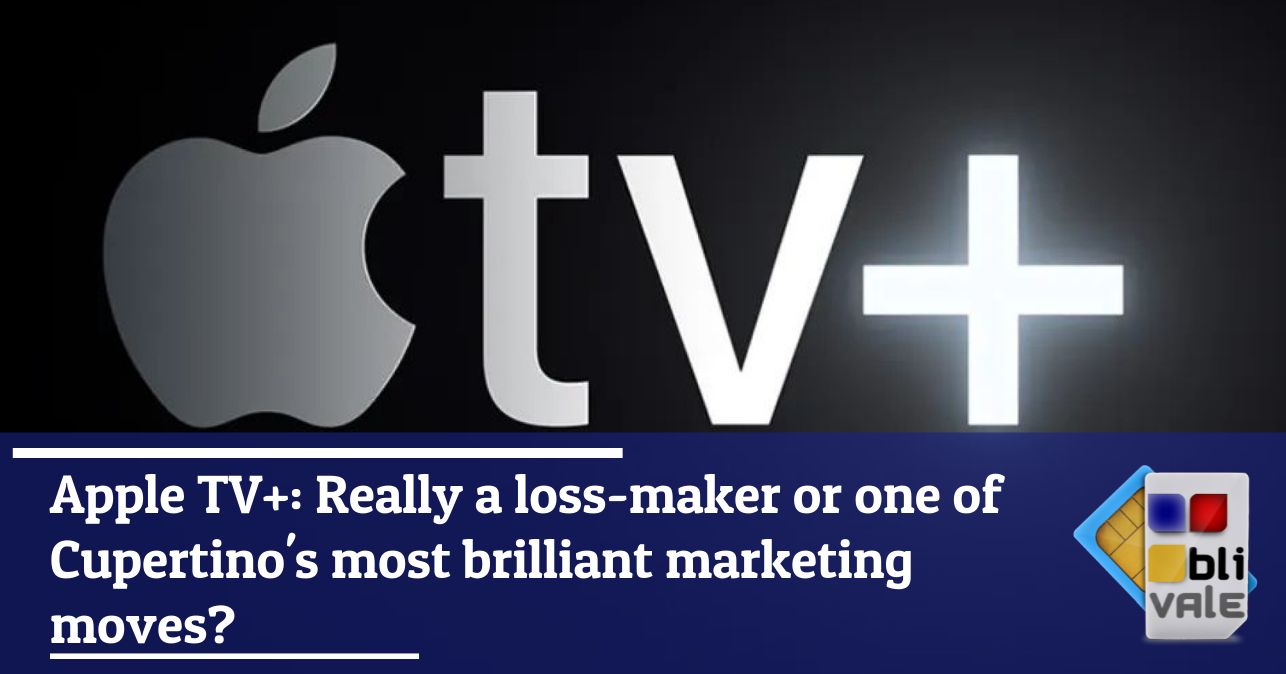When Apple launched Apple TV+ in November 2019, many analysts questioned whether the Cupertino company was truly intent on competing with Netflix and Disney+. The numbers, however, tell a different story: according to Bloomberg estimates, the streaming service has accumulated losses of over $20 billion since its launch. Yet, Tim Cook continues to invest heavily in original content. Why?
The answer lies in a marketing strategy so sophisticated it almost goes unnoticed: Apple TV+ was not designed to generate direct profits, but to be the perfect Trojan horse in the Apple ecosystem, capable of boosting sales of iPhones, iPads, AirPods, and all the company's digital services.
A loss-making service, but not for Apple
The data speaks for itself: Apple TV+ is struggling to gain significant market share in the streaming landscape. Apple TV+ is losing more than $1 billion annually, according to a report by The Information and confirmed by multiple industry sources. A former Apple TV+ employee who reviewed the company's business plan revealed that projected losses amount to $15–20 billion over the first decade, while Bloomberg reported that Apple surpassed $20 billion in content spending in the platform's first five years.
But looking only at Apple TV+'s direct numbers misses the bigger picture. The service's true value lies in its ability to retain users in the Apple ecosystem and incentivize the purchase of new devices. Every free subscription included with the purchase of an iPhone or iPad represents an investment in customer loyalty, not a cost.
Apple's strategy has always been to create an interconnected ecosystem where each product fuels demand for the others. Apple TV+ fits perfectly into this logic: it's not a standalone business, but an accelerator for the entire company portfolio.
Intelligent product placement in Apple content
A closer look at Apple TV+ original productions reveals something that's far from random: the protagonists use Apple devices almost exclusively. In hit series like "The Morning Show" or "Ted Lasso," iPhones, iPads, and AirPods appear constantly on screen, but in a natural, never-invasive way.
This integrated product placement represents an infinitely more effective form of advertising than traditional television commercials. When we see Jennifer Aniston answering a call with her AirPods or checking her iPad to read the news, the promotional message insinuates itself into the narrative without feeling artificial.
Apple has transformed each of its productions into a sophisticated technological showcase. Devices aren't simply shown: they're integrated into the characters' daily lives, concretely demonstrating how the Apple ecosystem can enhance users' productivity and entertainment.
Variety highlighted how this Apple marketing strategy represents an evolution of traditional product placement: instead of forced insertions, the company creates narratives where technology becomes an integral part of the story.
The Apple ecosystem at the heart of the strategy
The true brilliance of the Apple TV+ strategy lies in its ability to reinforce the perception of the Apple ecosystem as a complete and integrated solution. Every piece of content produced becomes an opportunity to showcase how iPhone, iPad, AirPods, and digital services work together in perfect harmony.
When someone answers a call on their iPhone and the conversation automatically continues on their AirPods, or when a document started on their iPad is completed on their MacBook, the message is unmistakable: the Apple ecosystem simplifies everyday life.
This Apple marketing strategy is based on a fundamental psychological principle: seeing technology in action is more convincing than any technical description. Bloomberg emphasized how Apple has understood that modern consumers don't buy individual devices, but integrated solutions that adapt to their lifestyles.
Apple services like iCloud, Apple Music, and Apple Pay are showcased in TV+ series as natural elements of daily routines, helping to normalize their use and drive audience adoption.
If you are thinking of taking a trip alone or with friends or for work, do not forget the importance of staying connected wherever you are. For unlimited Internet connection, contact BLIVALE where you can get unlimited Internet according to the destinations:
For unlimited plans like data BLIVALE guarantees free roaming anywhere in the world, no additional or hidden costs. Don't let the lack of connection stop you; get ready to explore the world with freedom and spontaneity.
The synergy between hardware and contents
Apple TV+ also has a direct impact on hardware sales. The company often includes free subscriptions to the service with the purchase of new devices, creating an immediate incentive to upgrade. According to The Wall Street Journal, this strategy significantly contributed to iPhone and iPad sales during the service's launch period.
The technical quality of Apple TV+ productions also serves to demonstrate the capabilities of Apple devices. Content is optimized to take full advantage of iPad's Retina displays, the audio quality of AirPods Pro, and the advanced features of iPhones. Every viewing becomes an implicit tech demo.
Integration with Apple TV 4K turns the streaming service into a selling point for home entertainment hardware. Users discover that to fully enjoy Apple TV+ content, they need the complete ecosystem, fueling a virtuous cycle of interconnected purchases.
Why this strategy works and does not go unnoticed
The Apple TV+ strategy represents a case study in modern marketing where value is measured not just in direct revenue, but in the overall impact on the brand and ecosystem sales. The Financial Times has defined this approach as "the future of technology marketing": instead of promoting individual products, companies create integrated experiences that demonstrate the value of their technological proposition.
The success of this Apple strategy is evident in increased customer loyalty and growth in average value per user. Apple TV+ subscribers tend to stay longer in the Apple ecosystem and make additional purchases more frequently than hardware-only users.
Additionally, the recognized quality of Apple TV+ productions—with Emmy and other international awards—helps elevate Apple's brand image beyond the tech sector, positioning the company as an influential cultural creator.
Conclusion: the marketing of the future passes through entertainment
Apple TV+ isn't a failure disguised as a creative experiment: it's the most sophisticated demonstration of how modern marketing can evolve from disruption to integration. While competitors compete for subscriber numbers, Apple has transformed its streaming service into a promotional tool for the entire business ecosystem.
This strategy hasn't gone unnoticed by industry analysts and competitors, who closely observe how Apple manages to transform every investment in content into a value multiplier for hardware and digital services. The centrality of the Apple ecosystem in the global market is thus reinforced through every TV series, every movie, every moment users see Cupertino technology seamlessly integrated into the daily lives of their favorite characters.
The message is clear: in an increasingly connected world, the most effective marketing doesn't interrupt the user experience, but enriches it. And Apple TV+, despite its losses, is perhaps the most underrated marketing success of the last decade.
And precisely because we live in an era of global mobility, the ability to access our favorite content wherever we go is essential. With BLIVALE Unlimited eSIMs, you can continue watching your favorite Apple TV+, Netflix, and Paramount+ series while relaxing on business trips, while sunbathing on vacation, or even on a plane by downloading the programs you want beforehand. Global connectivity transforms every moment of downtime into an opportunity to immerse yourself in stories that, as we've seen, do much more than entertain us: they show us the future of digital communication.
Verified sources for Apple TV+ leaks :
The Information (March 2025) - Original report revealed Apple is losing over $1 billion a year on streaming service The Information Deadline
Bloomberg (March 2025) - Apple has confirmed that it is losing $1 billion a year on its streaming ambitions. Watch Apple (Only) Loses $1B a year on Streaming - Bloomberg and previously reported that Apple has surpassed $20 billion in content spending during the first five years of the platform. Apple is apparently losing $1 billion a year on Apple TV+.
Variety (March 2025) - Reported that Apple TV+ is losing more than $1 billion per year while the company spends $4.5 billion annually on content Apple Streaming Losses Top $1 Billion per Year for Apple TV+: Report
MacRumors (March 2025) - Reported that Apple's initial business plan for Apple TV+ projected losses of $15 to $20 billion over the first decade. Report: TV+ Losing $1 Billion Annually as Apple Services Falter - MacRumors
Yahoo Finance (March 2025) - Confirmed information from a former Apple TV+ employee who had access to the company's business plan, which forecast losses of up to $20 billion. Apple is apparently losing $1 billion a year on Apple TV+.
Deadline (March 2025) - Cited two sources familiar with the matter to confirm losses exceeding $1 billion Apple Losing Over $1 Billion A Year On Streaming – Report









